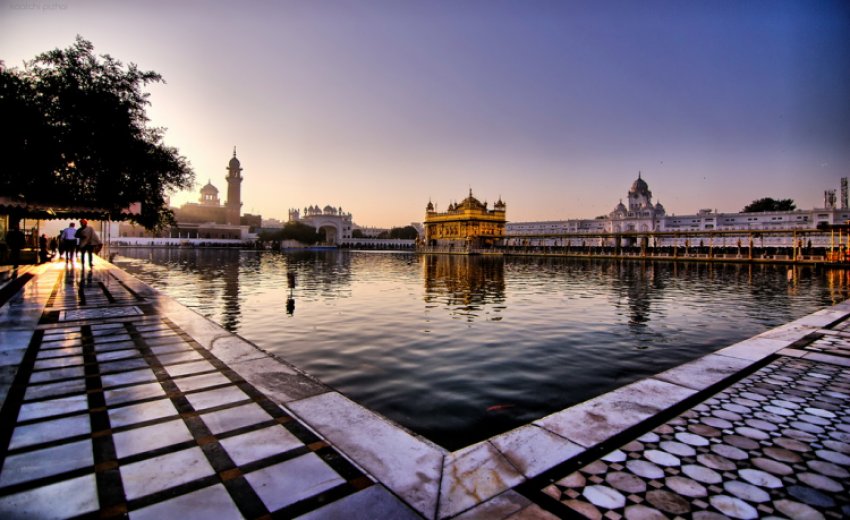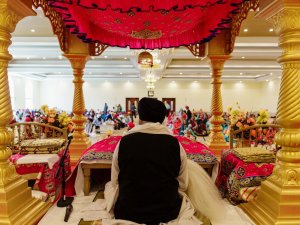The following article was written by high school student, Bani Kaur. Due to the lack of resources on the topic of women doing seva in Harmindar Sahib, much of her article is based on presumptions and her opinions. If anyone has good, primary sources on the topic, we would love if you could share them with us! That way we can update this article if needed.
Did you know that women are still banned from doing kirtan and participating in other seva at Harmandir Sahib? Sikhi was built primarily on equality, and Harmandir Sahib is supposed to be a prestigious representative of our faith. However, despite preaching so heavily on equality, women’s activities are restricted in darbar sahib presumably due to being “impure” because we menstruate.
When I hear people talk about how Sikh women are not allowed to do something today, I think about how Guru Nanak Sahib challenged such ideas 500 years ago. I think about this shabad:
From woman, man is born; within woman, man is conceived; to woman he is engaged and married.
Woman becomes his friend; through woman, the future generations come.
When his woman dies, he seeks another woman; to woman he is bound.
So why call her bad? From her, royalty is born.
From woman, woman is born; without woman, there would be no one at all.
O Nanak, only the True Divine is without a woman.
That mouth which praises the Divine continually is blessed and beautiful.
O Nanak, those faces shall be radiant in the Court of the True Divine.
(Guru Granth Sahib, Ang 473)
Why should women be excluded from seva because of menstruation? This menstruation allows for the birth of everyone and ironically, allows for the birth of those who deny her rights. No man would be here without a strong woman. Why shall you speak ill about a woman, when she was the one who gave birth to you?
Guru Nanak Sahib openly challenged people who claimed women to be “impure.” So, why do our leaders feel it is okay to manipulate the words of our Gurus? Consider this shabad reveald to Guru Nanak Sahib:
As a woman has her period, month after month,
so does falsehood dwell in the mouth of the false; they suffer again and again.
They are not called pure, who sit down after merely washing their bodies.
They are pure, O Nanak, within whose minds the Divine abides.
(Guru Granth Sahib, Ang 472)
A woman cannot control her menstruation cycles. Some may be fixed and some irregular. It is simply a process gifted to her by the Creator. Taking a shower simply doesn’t display your purity. Yes, you may be physically clean, but not mentally, as that is determined from within. A person is pure whose mind sits in the court of the Divine. In Guru’s court, the only thing that determines a woman’s purity is her devotion, which is through the mind, soul, and heart.
Regardless of our cycles, we should be allowed do nitnem, kirtan, and seva everywhere. There are no restrictions on reading and embracing Guru’s Baani. If the heart is craving Waheguru, then why place man-made constraints preventing a woman from doing so?
No leader, no man, no person is in a position to judge another woman or call her “impure.” Waheguru is the only one who can determine our worth.
In all reality, this logic is quite nonsensical. With this reasoning, one could argue no one should be allowed to do kirtan or any seva until all bodily waste is removed; dead skin cells all over your body, the hair that has fallen out but is still wrapped in your dastar, the little bit of sweat on your forehead, etc. After all, all of this is making us all “impure” by such logic. But Guru Sahib did not demand such ritualistic acts. He welcomed everyone to take darshan because we are all created equal.
I urge our leaders to instead of striving for political gains, to rather focus on the name of Waheguru. What difference does it make if a woman or man is doing kirtan ? Waheguru is not a man nor a woman, as one is not more superior than the other. The first word revealed to Guru Nanak Sahib and that starts Guru Granth Sahib is “Ek” (one). To me, this means that between you, me, and us, there is no difference as we are all children of the One. So, why do we create this difference that only men possess the right to do kirtan and seva at Harmandir Sahib? If it is for political gains, Baani has clearly stated to stay away from this mind-corrupting power. For a sacred place that is built on the elimination of ego, greed, and corruption, why do you practice it yourself? Do not mix corruption with purity.
One of the many qualities of a Gursikh is to put others before yourself. Yet, many giannis who call themselves “gursikhs” are sitting back in silence, not willing to protest this injustice, simply because it doesn’t involve them.
Mai Bhago was told to spread the teachings of Khalsa at home, and told to stay away from the battlefield simply because she was a woman. She trained herself to be a warrior, with help from her father. When Guru Gobind Singh Ji and others were attacked at Anandpur, her husband informed her that he was going to go for battle. When Mai Bhago wanted to join as well, he denied her, and told to take care of the home. After her husband came home, she was infuriated to know he had abandoned his Guru for his own personal safety. Mai Bhago rushed to Guru Sahib’s side to stand up and fight for freedom, without fear of death. She later became Guru Gobind Singh’s bodyguard. In this time period, the Guru’s welcomed and encouraged the seva of women. Women were able to serve. This was “allowed” then and it should be now. We were blessed with equality, and it’s on us to take hold of it.
What do we demand of ourselves as a people? We need to set an example for others and our generations to come. Gurudwaras should not be ran on a patriarchal norms. Let’s stand up and recognize our brave Kaurs!
By Bani Kaur





